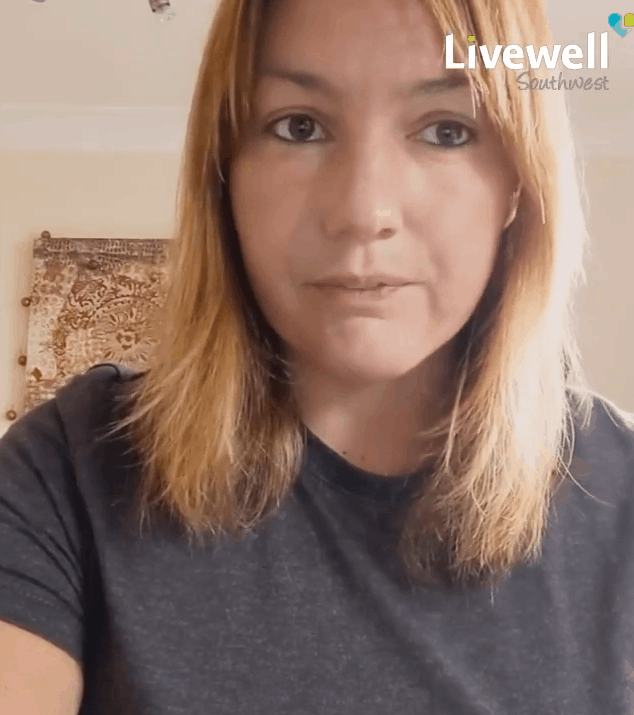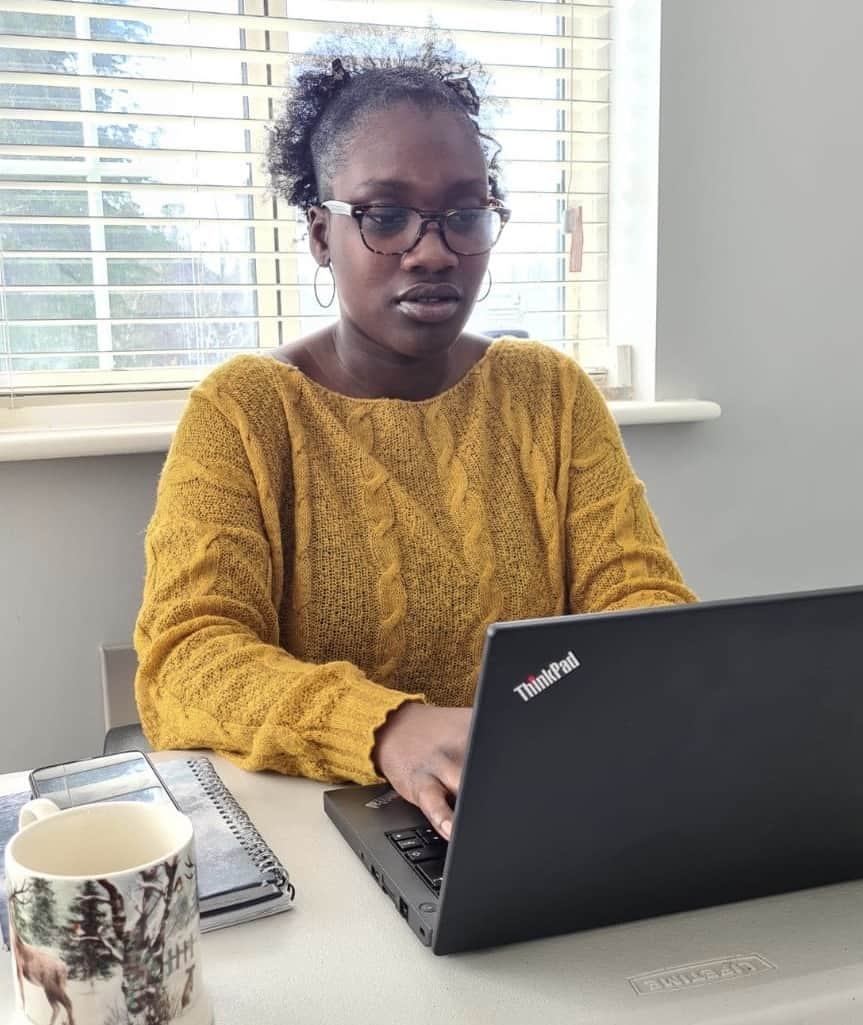Blog


This is Hope: a poem by Katy Else aka The Unheard Bird
Katy Else aka The Unheard Bird, a social worker at Livewell Southwest and talented poet, has written ‘This is Hope’ for the people of Plymouth in response to the COVID-19 Pandemic, and to illustrate how communities have come together to support each other during lockdown.
Tell us your social work story at stories@socialworkawards.com telling us your name, job, contact details and social care number (just so we know you’re a social worker, we will keep it private).

We may be in the same storm, but we are not all in the same boat.
This is a guest blog from Jade Watson, Social Worker for the Adults Social Care North East team at Shropshire Council.
Lockdown, for me, felt like a sudden shock, as though I was swimming amongst the waves representing the general conflicts both in social work and outside of social work, and then a tsunami hit me.
I had not recognised how much being in the office and talking to my colleagues meant to me; I joined the team in October 2019, and I have learnt that I am closer to my colleagues than I thought.
Although people may be in the same storm, we are not all in the same boat
In the Adults Social Care North East team, we have a buddy system, where we have been allocated one person to make an effort to contact during the working week. This has helped as, although people may be in the same storm, we are not all in the same boat. Each person has different circumstances and it is therefore helpful to talk about both work and social well-being with a colleague who is in the same line of work. We have also been having check-in meetings for council updates and to talk about team morale and adaptation.
Ensuring that we only went on essential house visits created an extra challenge. I was living on my own, so I isolated myself with my family and have been completing remote phone call assessments since lockdown. It seems so different having service users on my caseload who I have spoken to, but I have not seen in person.
I can recall going on a walk, as part of my daily exercise, around the start of lockdown, and coming across one of my encouraging primary school teachers. I explained my role and how I found it hard to not be seeing service users regularly. However, he thought that it was great that as a team we have been RAG rating (red, amber, green rating) people as part of a critical list and phoning them; adults who have been living alone have especially been appreciating this. I found this encouraging and it made me recognise that it is important to get up and think that, although working from home constantly is challenging, our work can mean a lot to those we phone, especially if they are feeling isolated.
Remote assessments
Completing phone call assessments has also allowed us as a team to reflect upon how we may be able to complete some re-assessments by phone call after lockdown if there has not been a lot of change and this can cut out commuting time.
When on duty I have also learnt that if someone requires an urgent Care Act assessment for them to have care in place immediately, a phone call assessment with the family and relevant professionals or carer can be more efficient.
For example, I experienced a service user who had no formal care in place but was being cared for by his daughter who needed to go to work. By liaising with the daughter and completing a remote mental capacity assessment, I was able to assess the service user’s care and support needs and ensure that he had a care agency supporting him as soon as possible.
Unfortunately, the service user ended up going into palliative care and dying, but the efficient response from the referral ensured that he was cared for and safe during the last few days of his life.
Remotely, I have adapted to providing well-written and robust risk assessments for when a service user’s placement was at risk due to a capital reduction in finances. I carefully listened to both her daughter’s account and the experiences of the carers within the service user’s care home, and how they had adapted to the service user’s challenging behaviours.
Well known around the care home for her assertive and feisty demeanour, the staff felt that it would be detrimental to place the service user in a different care home. Due to her dementia and her confrontational behaviours, it was observed that both her well-being and the well-being of staff and service users in a different care home would be compromised if she were to move.
Her daughter talked about how she had been previously been in a different placement but was asked to leave. However, in her current placement, her mother feels like she is at home.
Overall, I feel that lockdown has been a catalyst for re-assessing priorities and ways of working effectively.
Carers at the current placement ensure that they have one-to-one time with the service user to support her to feel calm and valued.
Originally, the care home was asking for £926 per week, but the manager said that she felt that she could not move anywhere else and the costs were brought down to £700 per week.
Overall, I feel that lockdown has been a catalyst for re-assessing priorities and ways of working effectively while best practice for those that we support are maintained, and for building upon and strengthening the resilience of the North East Adults Social Care team and Shropshire Council as a whole.
I have appreciated how colleagues, care agencies, and day services have thought creatively of how to offer extra support to those in need. For example, one of my service users has been provided with an activity box from a day service that he would not usually attend, who I liaised with.
It is positive to hear about day services reaching out of families and service users. I feel that after lockdown we will be grateful for the effectiveness of joint working throughout the local authority and that this collaborative work will continue.
Tell us your social work story at stories@socialworkawards.com telling us your name, job, contact details and social care number (just so we know you’re a social worker, we will keep it private).

Diary of a Director of Children’s Services: Part 2
Ana Popovici, Director of Children’s Services at Wandsworth Borough Council talks about clear lines of sight, the power of feeling safe and championing social justice.
During this crisis I had my first ever speed dating experience! This was with the Personal Advisers, social workers, participation and housing officers in the care leaving service. Each had a minute to put their question to me and I had a minute to reply, no more.
Our conversations and their stories highlighted for me the absolute need for a clear line of sight and connectivity between us all. This has renewed my commitment to making sure that my line of sight does not get blurred. And the outcome: we have got ourselves a commitment to a second date.
A big part of my role during this crisis has been in working with our community of schools and teachers. Our teachers and school staff have played a crucial role in supporting both their schools’ community and wider civic society in recent months.
The power of feeling safe
Many colleagues have suffered the loss of loved ones. Many have experienced heightened anxiety or even fear in the wake of this terrible disease. There is a risk of a pandemic anxiety settling in, including the fear of going outside or into public spaces which are not felt safe anymore.
Part of our recovery planning has to be to help people locally to feel safe again.
It reminds me of the transformative power of feeling safe. Part of our recovery planning has to be to help people locally to feel safe again. Then, now and in the future, our schools will continue to provide education, stability and continuity in a changed world.
If there are positives that we can take from our experience of the pandemic they are that circumstances have forced us to work in new and innovative ways, that colleagues have worked together and communicated in a way that maybe they haven’t before, and that we have become more aware of each other’s vulnerabilities and more sensitive to the situation that we each find ourselves in.
It is hard to imagine that life will go back exactly as it was before the pandemic. In many ways, the forever optimist in me wishes that we will collectively learn from this and strengthen practices which have emerged in this crisis. I would like us to use this crisis to generate change for the greater good.
Championing social justice
As I end this blog, I want to reflect on the most recent events around the globe which have brought the whole world together aligned and focused in a call for justice.
I want to share vibes of hope at times of sadness, despair and uncertainty – feelings we have all experienced since the appalling death of George Floyd. I know that George Floyd’s story had made raw the daily lived experiences of many black colleagues, children and families across the world of how they have been treated at times.
Whilst we might all feel angered and frightened, with the pandemic of racism now being in the public mind alongside the virus pandemic and the anxiety pandemic, I know that together we can continue to champion the fight against injustice and condemn racism with those determined actions which are within our power to bring about.
Tell us your social work story at stories@socialworkawards.com telling us your name, job, contact details and social care number (just so we know you’re a social worker, we will keep it private).

Lockdown diary: ‘We have limited access to vulnerable children’
This is a guest blog from Temi Osonaike, Senior Social Worker.
My alarm goes off at 8am prompt and I hop into the shower and shortly after, make myself a cup of green tea ready for the day ahead.
I have a table which I bravely collected from the spider web filled shed. I strategically placed this in my bedroom as this is the brightest room in the house.
I get to imagine I’m in a hot country, remote working…my imagination gets the better of me until I am rudely awakened by Microsoft Teams notifications. I am back in the comfort of my bedroom. I receive good morning messages from my team between 9am-9.15am and everyone is checked in and ready to commence their working day.
Checking in with children
“Hello Moto,” my work phone is switched on and phone calls begin to come in. Scheduled virtual visits with children and families subject to Child Protection and Children in Need Plans are under way.
For the most part parents and carers have been open to communication via WhatsApp video calls whilst others…well, the battle continues to ensure that the children are seen and heard.
The battle continues to ensure children are seen and heard.
Sighs of relief when I have checked in and seen that my children are safe.
In between phone calls and virtual visits I respond to emails, mainly from schools and health professionals, I share resources/tools with families and other colleagues, upload my case notes and meeting minutes and before I know it. 12:50 pm strikes. I receive an email reminder by my super team manager stating: ‘Team meeting starts in 10 mins, remember to log in to Microsoft Teams.’
Team meeting time
Whether we admit it or not, I for one look forward to connecting via MST with my team. I’ve observed a theme: one of my colleagues shares where her new location is during each meeting, on some days it has been Cuba, and other days it has been Colombia (in her dreams). Another of my colleagues doesn’t realise she is on mute and so we all gesture to her as if we are playing a game of charades that we can’t hear her, whilst another colleague logs in to the meeting in true social work style, a couple of minutes late.
My team manager quickly reigns everyone in and restores order to the video call. We discuss the feedback from the managers’ meeting and share our views on the impact this will have on our practice as social workers.
The meeting draws to an end, and everyone is reluctant to leave but true to our profession, we all quickly gain sight of the time and rush off (virtually) to our scheduled Children in Need review meetings or core group meetings.
At some point between the end of our daily team meetings and the end of the working day, I manage to top up on my cup of tea and get a snack. You’d think that working from home would mean you snack more because you have unlimited access to the kitchen. However, I have come to find that a day in my life as a social worker working from home is not quite the dream.
Heightened risk
The risk we are holding as professionals is heightened even more during this period, as we have limited face-to-face access to our most vulnerable children and families.
In turn we are having to evidence the extent to which we are going to ensure that we are managing such risk adequately from the confines of our home. We are doing all of this whilst ensuring we are in good enough health to be able to do this job during such a time as this.
Feelings of guilt, but also helplessness, consume me at times as I reflect on decisions yet to be made if and when a crisis is to come and I am asked to head out on a home visit. Is this a risk I am willing to take? Or is this a risk I should be taking?
I quickly deflect from this and imagine myself journeying to a hot country somewhere far from England, as the sun is blazing through my bedroom blinds.
The risk we are holding as professionals is heightened even more during this period.
I imagine myself sat on an aeroplane and vividly hearing the air hostess saying, ‘If you are a parent and you have a child, ensure you place your own mask on before that of your child’.
My imagination is disrupted by an email from my team manager asking who among us is fit and healthy and willing to go on a home visit if directed by senior management.
For now, I haven’t had to make that decision yet. But, in light of Covid-19, I have promised that I will ensure my own mask is on as a social worker before venturing into visits which would require me to place the masks on children and families to safeguard them from harm.

A day in the life of a Director of Children’s Services: Part 1
Ana Popovici, Director of Children’s Services at the London Borough of Wandsworth describes leadership in uncertain times, caring for vulnerable children and hybrid working.
Every day is a roller coaster when you are the Director of Children’s Services.
Working in lockdown during the Covid-19 outbreak has been a different roller coaster but equally scary and at times exhilarating – when you can see something you are familiar with in a new light.
“I feel sometimes I am building the aeroplane I am flying.”
Whatever our own individual situation, the pandemic has affected us all powerfully, either for better or for worse. The emotional turbulence within all of us is vivid in contrast with the eerily quiet external world, at least until recently.
Virtual working in itself has not phased me. The opposite is the case. I have been fortunate in my career to work in a national role so working virtually and being physically separated from colleagues whilst staying close emotionally and psychologically is familiar to me.
What is different, new and unsettling, especially with my Southern European blood, is the social distancing rules and the limitations to contact and togetherness this brings with it.
Leading teams in times of uncertainty
At the beginning of the crisis I often wondered whether our practice during Covid can remain accurate, humble yet decisive. I wondered whether we would still be able to continue our journey to improvement, which is our narrative story, locally, to keep our finger on the pulse and to make sure no child is left out or behind. I worried about vulnerable children falling through the net, being hidden out of sight as well as hidden in plain sight at times.
As a social worker, being criticised is an occupational hazard. Our work is intense emotional labour and the stakes are always stratospheric.
Working through ambiguity and having to be bold and brave in decision making to inspire the confidence of those around you does allow room for mistakes to be made. That is the reality. Sometimes I wonder which is worse, the fear of being criticised or taking no action.
Building the aeroplane as I fly
I choose, and also encourage my team, to take actions. Actions which are evidence based. I don’t say this with the intention of diluting accountability, I merely want to place the emphasis on having to lead and inspire teams at times of uncertainty.
And the same goes for social workers in their interactions with families, children and professionals. They lead complex, intricated relationships. My aspiration for our local model of leadership of power and empowerment is a distributed one – every social worker, every support worker, all of us are leaders, role models and ambassadors for children and improving their lives. We are all leaders of our caseload or workload.
In many ways the work in a Children’s Services department is business as usual. I feel sometimes that I am building the aeroplane I am flying, piloting the plane with all the automated systems down.
One head teacher said that to me as we were talking about trying to balance our practice during the crisis with thinking about what is to follow, the recovery, the re-building stage.
Hybrid working style
Our social workers have continued to work with grace out in the community and have stayed close to children. They have a hybrid working style – direct visits and virtual visits. They have been resilient and adaptive to all the challenges we have been facing.
I think that extraordinary situations such as this can bring out the best in people, and I have been so impressed by how we are all working differently with the use of technology to keep in touch with each other, with our partners and ensuring that our vital services have continued to operate in order to safeguard and protect children.
Being a corporate parent is one of the most important parts of my job. I have tried to stay in touch and stay close to our looked after children and care leavers, albeit virtually. I am also writing to them every week.
Look out for Part 2 of Anna’s blog next week.
Tell us your social work story at stories@socialworkawards.com telling us your name, job, contact details and social care number (just so we know you’re a social worker, we will keep it private).

Reflections on a Mental Health Act assessment
This is a guest blog by Greg Slay, approved mental health professional (AMHP).
One of the things that will stay with me from the period of Covid-19 lockdown is how resilient and enterprising Approved Mental Health Professionals (AMHPs) have been.
We have worked together with colleagues in specialist mental health services to support people through their own mental health crises – including arranging mental health hospital admissions as and when required – and we have thought up creative solutions to unexpected issues thrown in our direction.
Papers and plans in order
Last Sunday was no exception. I was on-call as an AMHP and was asked to complete a statutory application for a young man (in his late twenties) to be admitted to a mental health hospital in a neighbouring county, about 40 miles away.
I did not know the young man: he had been assessed under the Mental Health Act the previous day by one of my AMHP colleagues, and by two doctors. They concluded that he needed to be in a mental health hospital because the risks he would harm himself were high, and that he needed to be detained under the Mental Health Act because he was reluctant to go there.
I was given a town centre address, where I would be met by a community support worker from the local mental health crisis resolution and home treatment team and by a secure ambulance with three crew.
I collected the previously completed medical recommendations and wrote my statutory application, so that I would be ready. I knew I would still need to check his situation for myself and be satisfied having interviewed him, however briefly, that an application needed to be made.
A patio and a patient wait
We assembled at the house at the agreed time and quickly established that he was not at home. The community support worker contacted the young man by phone. He told her that he was at an address six miles away, laying a patio in a back garden in return for some money.
We decided to visit him at the alternative address. As the only person who knew and could recognise the young man, the community support worker came with us. The ambulance crew took the view that they were on the job now so they should not be ‘stood down’. So, we all went in our different vehicles.
When we got there we had a slightly strained conversation in which the young man explained that he was ‘rather busy’ with the patio-building and could he ‘go to the mental health hospital another day’?
It soon however became clear to him, and to me, that the reasons for various people having had concerns for his health and safety were correct and that it would be in his interest to be in hospital.
To take off some of the immediate pressure about the inevitable, I suggested he show us the work he had been doing that morning. He agreed and we followed him around to the back garden. The ambulance was brought to the rear of the house as well.
A person-centred process
It was there that he decided that he would go to hospital after all. We agreed to wait until his friend had returned from the builders’ merchant with more building supplies, and some cash for the work the young man had completed that morning.
So, we made ourselves as comfortable as was possible on a warm day, in a small back garden, with no seats! In fact, we didn’t leave for another 40 minutes or so.
The young man had only the clothes he was wearing and he asked the community support worker to arrange for some clothes from his home to be brought to him in hospital. She agreed and he gave her the key.
His immediate priority was to get some cash from his friend so he would be set up for ‘smokes’ at the hospital. Once the cash arrived, he just stepped into the ambulance and off they went.
Going the extra mile
I was struck by the willingness of my colleagues from the local mental health crisis resolution and home treatment team and from the secure ambulance service provider to respond with absolute focus, strength and a real sense of purpose to help get the young man to hospital.
As he left the address in the ambulance, he thanked us all for our patience and support.
With the benefit of a few days’ reflection I can see that we had gone the extra mile (literally) to support this person and we had not bundled him into the ambulance as soon as possible just to get a job done.
Work under the Mental Health Act can be quite challenging and stressful at the best of times but we were able to work together and be really person-centred and person-focused.
We enabled this young man to achieve an outcome which, whilst it might not have been entirely of his own making, was one in which he had been able to take part and in which to have some ownership.
Tell us your social work story at stories@socialworkawards.com telling us your name, job, contact details and social care number (just so we know you’re a social worker, we will keep it private).
